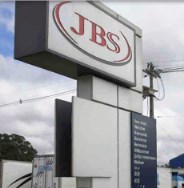
Brazil: Meat giant JBS prioritizes profits over health in brutal attack on its workforce
 JBS, the world's largest meat company, has presented workers in Brazil with a stark choice: risk potentially fatal illness, or risk losing your job.
JBS, the world's largest meat company, has presented workers in Brazil with a stark choice: risk potentially fatal illness, or risk losing your job.
On March 23, workers from the JBS units in Forquilhinha and Nova Veneza in the Brazilian state of Santa Catarina were brutally repressed for protesting the company's decision to keep the production lines running without adequate protection against the spread of the coronavirus.
Gisele Adão, leader of the meat workers union SINTIACR reported: "We started a strike [on March 19] because the health authorities have been recommending that there be no crowding of people in closed places… and in the processing plants there are 400 or 500 workers per shift."
On March 19, a labor court in Forquilhinha agreed to the union's demand to close the plants due to the hazardous conditions. The ordinance was withdrawn on March 23 under pressure from JBS. The company claimed that poultry processing is essential for supplying protein to the Brazilian population, but at least 80 percent of what JBS produces in Santa Caterina is for export.
When workers at both meat processing plants in Santa Catarina protested on March 23 in front of the plants, they were violently attacked by the civil and military police under JBS command. Tear gas was fired at the workers and Celio Elias, former president and current adviser to the union, was arrested. (Watch the video here)
Adão commented "We are struggling to protect our health, the health of our families and the entire community, because it is useless to quarantine some people, when we have to travel crowded in the transport and then we are next to each other working. It seems that the workers of the meat packing plants are nothing to society,"
Brazil-based JBS is the world's largest meat processing company, with beef and poultry plants throughout the Americas, and in Europe and Australia. On its climb to global dominance it has closed plants, fought health and safety regulations and thrived on low wages. Top executives have been found guilty of bribing politicians and safety inspectors to allow the marketing of rotten meat.
 Facebook
Facebook Google+
Google+ Reddit
Reddit Twitter
Twitter






